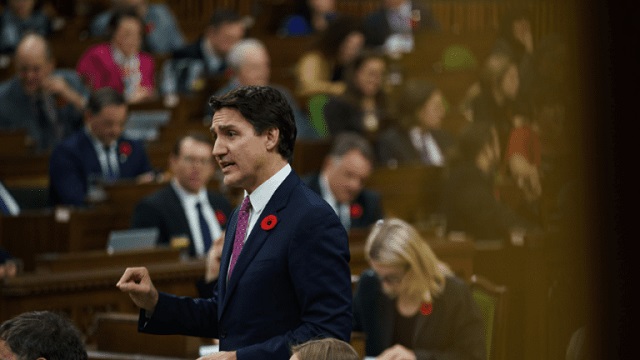Automotive
Of all top-heavy Liberal climate policies, electric-vehicles mandate is the worst

From the MacDonald Laurier Institute
“History has shown us time and again that government quotas are no match for the market.”
To meet Canada’s commitment to its Paris Agreement climate goals, the federal government has announced increasingly heavy-handed emissions reduction policies this year. It culminated Monday in the publication of regulated targets for electric-vehicle sales: an EV mandate.
History has shown us time and again that government quotas are no match for the market. The Liberals want to show us one more time why this is the case.
There is absolutely nothing wrong with EVs. Those who own them tend to love them. The car manufacturing industry is all-in on EVs, and globally has committed US$1.2-trillion toward electrification.
The problem is in the attempt to dictate, by government fiat, what consumers can or cannot buy. In the case of the EV mandate, the federal government is using dealers to enforce their strategy. One hundred per cent of light duty vehicles sold in Canada by 2035 must be EVs, with mandatory sales targets starting at 20 per cent in 2026.
If a dealer falls under the prescribed target for a particular year, they are required to buy expensive credits or pay for public charging stations to atone for their sin. The most likely response will be to sell fewer gas-fuelled vehicles than demand would indicate in order to meet the required ratios and avoid the penalties.
You don’t have to be an economist to predict the outcome: waiting lists, shortages and a black market for internal combustion engines. But it’s worth being specific about why a federal EV mandate can’t overcome the laws of supply and demand.
The first is the cost of EVs: They are more expensive than internal combustions engines. EV adoption is overwhelmingly led by urban, high-income consumers who can charge at home. Aside from nudging auto manufacturers to build charging stations, whose uptake is questionable, the mandate addresses none of the logistical and financial constraints that apartment dwellers, renters and low-income car owners face in owning an EV.
The federal government has pointed to Norway, where almost 90 per cent of new car sales are EVs, as an example of how these challenges can be overcome. But that country’s EV uptake is driven by a hefty subsidy, more than triple the Canadian amount, at about $16,000 a vehicle (and made possible by the revenues from their oil and gas exports). That’s the equivalent of a $700 a tonne carbon tax, and last year it represented 2 per cent of their national budget. I can think of no more expensive way to reduce emissions.
The second problem with the EV mandate is that the dealers don’t control the electricity grid. In parallel with the mandate, the federal government is also pushing Clean Electricity Regulations, which will severely strain utilities’ ability to meet additional demand. And it’s not just capacity that matters – it’s the ability to distribute additional power into millions of homes. In many neighbourhoods and small towns, that distribution capacity does not exist, and it will be very expensive to add.
The third is range in rural and remote areas. The federal government acknowledges that lack of charging infrastructure and battery performance in cold weather is an issue. But they just assume that it will be worked out over time – no need to worry about it now.
Fourth is the ability of manufacturers to ramp up their production to meet EV mandates and incentives across the Western world. This will depend on a supply chain that does not yet exist, from critical minerals, to mechanics, to electricians. And it will depend on greater profitability in the sector, which, outside of China, is mostly selling EVs at a loss.
No amount of regulation from Ottawa can solve all of these problems. There are some that see the EV mandate as a Hail Mary from a government that is unlikely to win re-election. The mandate, therefore, is a foolish but benign distraction.
But for refiners, whose profitability depends on some level of gasoline demand, it causes tremendous uncertainty. As long as the EV mandate hangs over their heads, they will be unlikely to invest in upgrading their existing assets, even to produce clean fuels (as mandated this year under the Clean Fuel Regulations, but which EVs would not use), and they will be very reluctant to invest in new refineries.
With our fast growing population, this will inevitably squeeze the availability of the many refined products and distillates the Canadian economy still needs. There is a cost to these policies, even when unimplemented.
The series of climate policies the Liberals have imposed since Steven Guilbeault was appointed Minister of Environment have mostly applied to industry. But the EV mandate targets consumers, limiting what they can and cannot buy when it comes to their vehicle.
Alas, consumers are voters. And command economies don’t work well in democracies.
Heather Exner-Pirot is director of energy, natural resources and environment at the Macdonald-Laurier Institute.
Automotive
Canada’s EV experiment has FAILED

By Dan McTeague
The government’s attempt to force Canadians to buy EVs by gambling away billions of tax dollars and imposing an EV mandate has been an abject failure.
GM and Stellantis are the latest companies to back track on their EV plans in Canada despite receiving billions in handouts from Canadian taxpayers.
Dan McTeague explains in his latest video.
Automotive
Carney’s Budget Risks Another Costly EV Bet

From the Frontier Centre for Public Policy
GM’s Ontario EV plant was sold as a green success story. Instead it collapsed under subsidies, layoffs and unsold vans
Every age invents new names for old mistakes. In ours, they’re sold as investments. Before the Carney government unveils its November budget promising another future paid for in advance, Canadians should remember Ingersoll, Ont., one of the last places a prime minister tried to buy tomorrow.
Eager to transform the economy, in December 2022, former prime minister Justin Trudeau promised that government backing would help General Motors turn its Ingersoll plant into a beacon of green industry. “By 2025 it will be producing 50,000 electric vehicles per year,” he declared: 137 vehicles daily, six every hour. What sounded like renewal became an expensive demonstration of how progressive governments peddle rampant spending as sound strategy.
The plan began with $259 million from Ottawa and another $259 million from Ontario: over half a billion to switch from Equinox production to BrightDrop electric delivery vans. The promise was thousands of “good, middle-class jobs.”
The assembly plant employed 2,000 workers before retooling. Today, fewer than 700 remain; a two-thirds collapse. With $518 million in public funds and only 3,500 vans built in 2024, taxpayers paid $148,000 per vehicle. The subsidy works out to over half a million dollars per remaining worker. Two out of every three employees from Trudeau’s photo-op are now unemployed.
The failure was entirely predictable. Demand for EVs never met the government’s plan. Parking lots filled with unsold inventory. GM did the rational thing: slowed production, cut staff and left. The Canadian taxpayer was left to pay the bill.
This reveals the weakness of Ottawa’s industrial policy. Instead of creating conditions for enterprise, such as reliable energy, stable regulation, and moderate taxes, progressive governments spend to gain applause. They judge success by the number of jobs announced, yet those jobs vanish once the cameras leave.
Politicians keep writing cheques to industry. Each administration claims to be more strategic, yet the pattern persists. No country ever bought its way into competitiveness.
Trudeau “bet big on electric vehicles,” but betting with other people’s money isn’t vision; it’s gambling. The wager wasn’t on technology but narrative, the naive idea that moral intention could replace market reality. The result? Fewer jobs, unwanted products and claims of success that convinced no one.
Prime Minister Mark Carney has mastered the same rhetorical sleight of hand. Spending becomes “investment,” programs become “platforms.” He promises to “catalyze unprecedented investments” while announcing fiscal restraint: investing more while spending less. His $13-billion federal housing agency is billed as a future investment, though it’s immediate public spending under a moral banner.
“We can build big. Build bold. Build now,” Carney declared, promising infrastructure to “reduce our vulnerabilities.” The cadence of certainty masks the absence of limits. Announcing “investment” becomes synonymous with action itself; ambition replaces accountability.
The structure mirrors the Ingersoll case: promise vast returns from state-directed spending, redefine subsidy as vision, rely on tomorrow to conceal today’s bill. “Investment” has become the language of evasion, entitlement and false pride.
As Carney prepares his first budget, Canadians should remember what happened when their last leader tried to buy a future with lavish “investment.”
A free economy doesn’t need bribery to breathe. It requires the discipline of risk and liberty to fail without dragging a country down. Ingersoll wasn’t undone by technology but by ideological conceit. Prosperity cannot be decreed and markets cannot be commanded into obedience.
Every age invents new names for old mistakes. Ours keeps making the same ones. Entitled hubris knows no bounds.
Marco Navarro-Genie is vice-president of research at the Frontier Centre for Public Policy and co-author, with Barry Cooper, of Canada’s COVID: The Story of a Pandemic Moral Panic (2023).
-

 Agriculture2 days ago
Agriculture2 days agoDanish Cows Collapsing Under Mandatory Methane-Reducing Additive
-

 Alberta2 days ago
Alberta2 days agoAlberta government’s plan will improve access to MRIs and CT scans
-

 Daily Caller15 hours ago
Daily Caller15 hours agoUS Eating Canada’s Lunch While Liberals Stall – Trump Admin Announces Record-Shattering Energy Report
-

 Business2 days ago
Business2 days agoCarney government’s first budget should signal end to crippling ‘climate’ policies
-

 Business2 days ago
Business2 days agoNo Jobs Clause: Liberals Under Fire Over Stellantis Deal in Fiery Committee Showdown
-

 Censorship Industrial Complex1 day ago
Censorship Industrial Complex1 day agoHow the UK and Canada Are Leading the West’s Descent into Digital Authoritarianism
-

 Energy16 hours ago
Energy16 hours agoEby should put up, shut up, or pay up
-

 Business1 day ago
Business1 day agoCapital Flight Signals No Confidence In Carney’s Agenda




